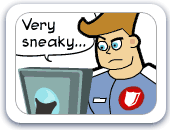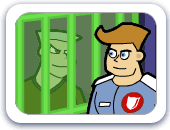Shortcuts:.
Learn more about Cyber Crimes and Criminals in Officer Ward's blog archives:
A cyber crime is a crime that is committed with the help of a computer or communication device and a network, like the Internet. According to the United States Department of Justice, there are three different types of cyber crimes:
- The computer as a target - attacking other people's computers with malware or other damaging attacks.
- The computer as a weapon - committing "traditional" crimes that can be committed offline too, such as theft or illegal gambling.
- The computer as an accessory - using a computer to store illegal or stolen information.
Victims of cyber crimes can lose their money, their jobs, their dignity and their good name, and it can take years to repair the damage. Remember, if it's a crime offline, you can bet it's also a crime online, and it can have just as severe of a punishment.
Cyber Criminals
Here you will find information about the people who commit cyber crimes.

How Cyber Criminals Operate
Cyber criminals take advantage of vulnerabilities and people's emotions.

Catching Cyber Criminals
It takes some clever tactics to keep up with cyber criminals.

Cyberspace's Most Wanted
Also known as Officer Ward's Wall of Shame, Cyberspace's most notorious cyber criminals.
Cyber Crime Database
These and other cyber definitions can be found in the Cyberpedia.
I
Identity Theft
Stealing somebody else's personal information to pretend to be them. People usually do this to steal money from someone's bank account or buy things with their credit cards.
Learn more: Cyber Crimes and Criminals
Insider Attack
When someone who has permission to access a system or network misuses that access to attack the network or steal data. Insider attacks can be difficult to trace because most security measures are designed to protect against outside attacks and insiders can know how to avoid them. They can also happen by accident when a network isn't properly secured, someone can stumble across data that they shouldn't be allowed to access.
Learn more: Cyber Crimes and Criminals
Internet Fraud
Using the Internet to intentionally deceive someone for personal gain or to harm them. Also see Hoax.
Learn more: Cyber Crimes and Criminals
Intrusion
Illegally entering or taking another person's property. A cyber intrusion is when someone who does not have permission gains access to a computer or network. Also see Hacking.
Learn more: Cyber Crime and Criminals
M
Man-in-the-Middle Attack
Spying on communications between two parties without their knowledge. The spy can then read and change the data as they intercept it.
Learn more: Cyber Crimes and Criminals
Misinformation
Incorrect or false information.
Learn more: Evaluating the Information
N
Network Sabotage
The deliberate disruption of a computer network, either by destroying it or blocking it.
Learn more: Cyber Crimes and Criminals
P
Pharming
A social engineering scam that is similar to phishing but it does not require an initial email for bait. Victims are redirected to a fake website when they are trying to visit a safe one. The fake website prompts them to enter their personal information, like their password or credit card number, so that cyber criminals can steal it.
Learn more: Cyber Crimes and Criminals
Phishing
A social engineering scam in which the cyber criminal sends a potential victim an email with a link to a fake website. The email message and website are designed to trick the victim into thinking they are from a credible source like their bank or PayPal. If the victim falls for it and enters their information into the site, the cyber criminal can steal it.
Learn more: Cyber Crimes and Criminals
Phishing Filter
Defensive software that protects you from phishing attacks. Phishing filters are usually an add-on for web browsers or email software, and they attempt to identify phishing content in web pages and emails.
Learn more: Computer and Device Defense
Plagiarism
From the word "plagiarius," meaning "to plunder," copying someone else's written or creative work without their permission and pretending that it is your own.
Learn more: Avoiding Plagiarism
Proxy Server
See Server, Proxy
S
Scam
See Internet Fraud.
Script Kiddie
Somebody who uses hacking software created by someone else to break into people's computers. Script kiddies usually do not know how to hack on their own.
Learn more: Cyber Crimes and Criminals
Server, Proxy
A server that has a job to do with information travelling between a computer and another server on the network. Some proxy servers protect users' personal information by encrypting their connection, others block certain websites or scan for malware before the data is delivered. They can also be used for bad purposes, like to access a website that someone does not have permission to access.
Social Engineering
A tactic used by cyber criminals that uses lies and manipulation to trick people into revealing their personal information. Social engineering attacks frequently involve very convincing fake stories to lure victims into their trap.
Learn more: How Cyber Criminals Operate
Spam
The Internet version of junk mail, a cyber crime where someone sends the same message to several people, usually to advertise something. Spammers collect email addresses for their attacks by illegally scanning cookies or looking for addresses on websites.
Learn more: Cyber Crimes and Criminals
U
Unsafe Forms
Forms that ask for personal information, like a credit card number. Cyber criminals can trick people into giving them your personal information by filling out a fake form.
Learn more: Communicating Safely
V
Vulnerabilities
Security holes or weaknesses in a piece of software that a cyber criminal can take advantage of.
Learn more: Maintaining Your Defenses
W
Website Vandalism
The "graffiti" of cyberspace, a cyber crime where someone tampers with or damages another personís website.
Learn more: Cyber Crimes and Criminals
Weirdo Strangers
See Cyber Predator.
White Hat Hacker
See Hacker, White Hat.
Z
Zero Day Attack
A cyber attack that takes advantage of vulnerabilities in newly released and un-patched software. Cyber criminals launch the attack on the first day new software is available, before the developers can create and distribute a patch for it.
Learn more: Cyber Crimes and Criminals
Zombie Computer
A computer that has been hacked into and is used to launch malicious attacks or to become part of a botnet.
Learn more: How Cyber Criminals Operate
B
Black Hat Hackers
See Hacker, Black Hat.
BotNet
A network of bits of software that run themselves, like robots or "bots." BotNets are created by cyber criminals to quickly distribute malware.
Learn More: Cyber Criminal Attack Techniques
C
Cheating Software
Hacking software for computer games that gives a player an unfair advantage over others. Cheating software violates the Terms of Use for most games and using it can get your account banned.
Learn more: Respect the Terms of Use
Children's Online Privacy Protection Act (COPPA)
An act created by the United States Federal Trade Commission (FTC) to protect the personal information of children in cyberspace. In order to comply, websites that collect information from children under the age of 13 (like for registering an account) must require a parent's permission before they do so.
Learn more: Children's Online Privacy Protection Act (COPPA)
Cold Shoulder
To ignore someone, one way to protect yourself from cyber criminals.
Learn more: Protecting Your Personal Information
Copyright
The rights granted to the author or creator of an original work such as a book, song, website, or picture. It gives the creator the right to copy, distribute and adapt the work, and prevents other people from doing so without getting the creator's permission first.
Learn more: Avoid Plagiarism
Copyright Infringment
Using works that are protected by copyright without getting the author's permission first.
Also see Cyber Piracy
Cyber Bully
Someone who bullies others in Cyberspace.
Also see Cyber Bullying
Cyber Bullying
Using the Internet to harass, intimidate, embarrass, or put down others. This can include posting embarrassing information on web pages, tricking people into giving out personal information, sending threatening or cruel messages or emails, or pretending to be somebody else to send mean or embarrassing messages.
Learn more: Cyber Bullying
Cyber Crime
A crime committed with the help of a computer or communication device and a network. The network is usually the Internet, but it can also include mobile device networks.
Learn more: Cyber Crimes and Criminals
Cyber Crime Units
Special law enforcement and government units created to combat cyber crime by investigating cyber crimes and tracking down cyber criminals.
Learn more: Cyber Crime Units
Cyber Criminal
A person who commits a cyber crime.
Learn more: Cyber Crimes and Criminals
Cyber Defender
Someone who is trained to defend Cyberspace from cyber criminals.
Cyber Forensics
The process of extracting data from devices or systems, like a computer or a network, usually to examine as evidence of a cyber crime.
Learn more: Catching Cyber Criminals
Cyber Monday
The first Monday after Thanksgiving, it is the peak online holiday shopping day in the United States. It is also a big day for cyber crimes and scams, as cyber criminals try to take advantage of the online shoppers.
Learn more: Defenses for Online Shopping
Cyber Piracy
Using a computer to copy or share materials that are protected by copyright without the creator's permission. The most common form of cyber piracy is copying and distributing music, movies or software programs, but it can also be as simple as installing certain software on more than one computer.
Learn more: Cyber Crimes and Criminals
Cyber Predator
Someone who uses the Internet to find young children, often because they want to meet the child in person and hurt them.
Learn more: Communicating Safely
Cyber Squatting
When someone registers a domain name so they can sell it for a high price later to someone who really wants it. Some cybersquatters buy URLs that are similar to popular existing sites to fool people into checking their sites out.
Learn more: Cyber Crimes and Criminals
Cyber Stalking
An aggressive form of cyber bullying, using the Internet to follow, harass or contact others in an unwanted manner. Like offline stalking, cyber stalking is a threatening behavior and is illegal.
Learn more: Cyber Crimes and Criminals
Cyber Villain
A very dangerous cyber criminal.
Cyber Woozling
Gathering data from someoneís computer without their knowledge or permission when they visit a website. This is done through web browser cookies, user-installed plug-ins and extra code sent to the personís computer. Stolen information can include email addresses, what websites you visited and how long you spent at them.
Learn more: Cyber Crimes and Criminals
D
Defamation
Saying things that are not true in order to harm someone's reputation. Defamation is a method sometimes used by cyber bullies and is illegal.
Learn more: Cyber Bullying
Denial-of-Service Attacks
Flooding a network or server with traffic in order to make it unavailable to its users. A Denial-of-Service attack can make a website completely unusable and is a tactic used by cyber criminals to harm businesses or companies.
Learn more: How Cyber Criminals Operate
E
Email Bombing
Sending a large number of email messages to an email address, which can make the email address unusable or even cause the mail server to crash.
Learn more: Cyber Crimes and Criminals
Extortion
A crime where someone tries to obtain something from another person, like their property or money, by forcing them against their will. This can be done with threats or promised rewards.
Learn more: Cyber Crimes and Criminals
F
Fraud
See Internet Fraud.
G
Gold Farmers
People who play online games to earn game money to sell to others online. Selling and purchasing this gold is usually in violation of the Terms of Use, and the workers who actually play the game are usually treated horribly by the company and make very little money.
Learn more: Cyber Crimes and Criminals
Grey Hat Hacker
See Hacker, Grey Hat
Griefer
Someone who acts like a cyber bully or asks for your account information in an online game.
Learn more: Online Gaming Netiquette
H
Hacker
A person who hacks into computers to view or alter information that they don't have access to.
Learn more: Cyber Crimes and Criminals
Hacker, Black Hat
Hackers who use their computer expertise to break into systems and steal information illegally. Also see Hacker, White Hat, and Hacker, Grey Hat
Learn more: Catching Cyber Criminals
Hacker, Grey Hat
A former Black Hat hacker who turns away from crime to be like a White Hat hacker and help fight cyber crime.
Learn more: Reformed Cyber Criminals
Hacker, White Hat
A hacker who is a cyber defender and specializes in testing the security of information systems. They will attempt to hack into a company's network and then present the company with a report detailing the existing security holes and how those holes can be fixed.
Learn more: Catching Cyber Criminals
Hacking
Breaking through a computer or network's security defenses to view or alter information that the intruder does not have access to.
Learn more: Cyber Crimes and Criminals
Hoax
A deliberate attempt to deceive or trick someone into believing or accepting that something is real or true, when the hoaxster knows it is not. A hoax is similar to fraud, but a hoaxster doesn't intend to gain anything from the victim or harm them.
Learn more: Evaluating the Information

